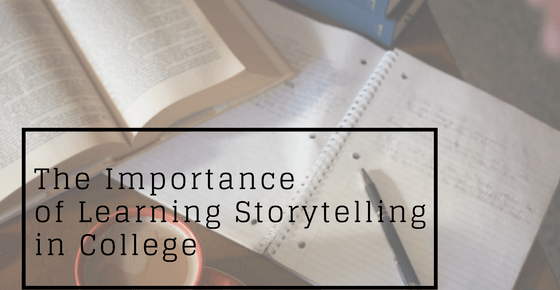The Importance of Learning Storytelling in College
 For us humans, stories are everything. Think about it: our perception of life is a story, with the person living that life as the protagonist. Even the grand sweep of human history at large is thought about as a story, albeit a long and complex one. After all, ‘history’ and ‘story’ share the same root, and were until not so long ago the same word.
For us humans, stories are everything. Think about it: our perception of life is a story, with the person living that life as the protagonist. Even the grand sweep of human history at large is thought about as a story, albeit a long and complex one. After all, ‘history’ and ‘story’ share the same root, and were until not so long ago the same word.
Why are stories so important for humans? Because, whatever is there to be said about our logical brain, in the end we are emotional creatures, and while we be capable of storing raw information, it’s only when we have an emotional connection to it that it really becomes seared on our memories.
Here lies the power of storytelling. Storytelling makes us care. Think about anything you care about, and there’ll certainly be a story attached to it, however simple. We anthropomorphize animals and even objects that we are attached to so they can be characters in their stories. We see conflict in every interaction. In short, stories are the basic unit of our understanding of the world.
Smart people in the world of business and marketing know this. Unfortunately, our outmoded post-industrial educational system hasn’t caught up to this yet. In a way, story-telling is penalized in school when we are children. We are expected to have a robot-like mentality, to answer the teacher’s questions with pithiness and efficiency, and storytelling is down-played and even penalized.
This is a real pity, because the skill of storytelling is essential in the world we live in, and it’s bound to become more and more important as the years go by. Storytelling is the foundation of the art of persuasion, and such essential in negotiation, salesmanship and even basic human interaction.
In fact, storytelling might even be the key to a much better educational system. Sara ElShafie, a biology graduate student from Chicago, has been one of the first ones to caught up on this and try to implement storytelling in a teaching context. Not knowing herself much about storytelling, ElShafie asked the most acclaimed storytellers of our era: Pixar’s writing staff. She got the idea because Pixar movies rarely deal with human subjects, focusing instead on animals, inanimate objects, or even, in their latest movie, the teenage emotions.
Pixar immediately agreed to help, and together they crafted a series of workshops dedicated to frame dry scientific concepts into a story with characters, conflict and revelations. The results were astounding. The workshops not only attracted students, but members of the faculty and staff. They were a complete success, even though the workshops ultimately dealt with subjects that would put most people to sleep.
The genius of ElShafie was to adapt strategies from filmmaking to science education. After all, filmmakers have been polishing the art of grabbing the public’s attention for more than a century. Marry this showmanship to actual scientific content and you’ll have an effortless educational tool. And in the end, everything boils down to engaging the emotions. In ElShafie’s own words: “Science is not just about learning science, but about discovering your potential and learning about the world around you.”
And this is not just one anecdotal piece of evidence. Diann Moorman, PHD, recently published a study which demonstrated that students recall information learned through storytelling much better than information learned by traditional means. Her study aimed to prove the effectiveness of storytelling strategies to memorize material for a given curricular semester. However, when she followed up on her subjects, Diann discovered that the material learned through storytelling was retained by the students for a long time after the semester was over. The discovery is very important; after all, one of the main problems plaguing the examination model of education is the way students retain information only long enough to put it down to paper.
But maybe the main reason why storytelling has been the most successful communication strategy throughout history is that stories help build our sense of community. Narratologists insist that, at the heart of all successful stories, there is empathy. It encourages us to feel connected to the subject of our history, be it an ancient Hanoverian king or a potential cure for cancer. An alert sense of empathy helps breed feelings of community – which will in the future be more important than ever before.
Now that computers and AIs are taking over the bulk of humdrum mental activity, the role of humans in future society will be increasingly social. Knowing how to be a team-worker will be an essential skill. If we look back at recent history, we’ll see that the time when inventions and discoveries were made by single individuals – the times of Edison, Tesla and Einstein – is mostly gone. Today, most important developments in any fields are made by teams. Even when there is a science and tech celebrity today – such as Steve Jobs or Elon Musk – they’re successful not so much on the basis of their technical knowledge, but because of their communication skills. Most of their advances are made by dedicated teams of experts on his payroll – experts that must rely on mutual work and understanding if they want to do a good job.
Storytelling is therefore one of the most important and most overlooked skills for the modern world. For college students looking for a future after getting their degree, a capacity for storytelling might be the key to success.